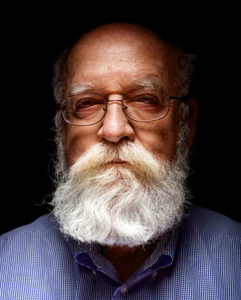 Philosopher Daniel Dennett of Tufts University will deliver the annual Merlan Lecture at Scripps College on Tuesday, February 16, at 4:15 p.m. in Balch Auditorium. Focusing on the intelligent design debate, Dennett will speak on “Difficulties with Darwin’s Dangerous Idea: What Fodor and Nagel Don’t Understand.” A question-and-answer session and reception will follow. Sponsored by the Scripps College Department of Philosophy, the event is free and open to the public.
Philosopher Daniel Dennett of Tufts University will deliver the annual Merlan Lecture at Scripps College on Tuesday, February 16, at 4:15 p.m. in Balch Auditorium. Focusing on the intelligent design debate, Dennett will speak on “Difficulties with Darwin’s Dangerous Idea: What Fodor and Nagel Don’t Understand.” A question-and-answer session and reception will follow. Sponsored by the Scripps College Department of Philosophy, the event is free and open to the public.
Dennett’s Darwin’s Dangerous Idea, published by Simon & Shuster, was a finalist for the 1995 National Book Award in non-fiction. In the book, Dennett writes: “The kindly God who lovingly fashioned each and every one of us and sprinkled the sky with shining stars for our delight—that God is, like Santa Claus, a myth of childhood, not anything a sane, undeluded adult could literally believe in.”
Darwin’s Dangerous Idea inspired much debate within the scientific and academic community. In the New York Review of Books, Stephen Jay Gould criticized Dennett for writing an “influential but misguided ultra-Darwinian manifesto.” In the same publication, John Maynard Smith wrote: “It is therefore a pleasure to meet a philosopher who understands what Darwinism is about, and approves of it.”
Dennett is currently the Austin B. Fletcher Professor of Philosophy and co-director of the Center for Cognitive Studies at Tufts University. He has received two Guggenheim Fellowships, a Fulbright Fellowship, and a Fellowship at the Center for Advanced Studies in Behavioral Science. He was elected to the American Academy of Arts and Sciences in 1987, and is a Humanist Laureate of the International Academy of Humanism and a Fellow of the Committee for Skeptical Inquiry. The American Humanist Association named him the 2004 Humanist of the Year. Dennett’s prodigious writings include Consciousness Explained (Little, Brown 1991), Brainstorms: Philosophical Essays on Mind and Psychology (MIT Press 1981), Sweet Dreams: Philosophical Obstacles to a Science of Consciousness (MIT Press 2005), and Neuroscience and Philosophy: Brain, Mind, and Language (Columbia University Press 2007) co-authored with Maxwell Bennett, Peter Hacker, and John Searle.
The Merlan Lecture was established by the Scripps College graduating class of 1969 to honor the memory of Professor Philip Merlan, who taught philosophy at Scripps College for 25 years. The author of books that have become classic works of philosophy, Merlan also wrote more than 300 papers. His wife, Franciszka Merlan, edited a posthumous eight-volume series of Philip Merlan’s papers and was a respected scholar and teacher in her own right, holding positions at Columbia, Krakow, Pomona, and Scripps College. Her name was added to the lectureship in 1983 in tribute to her contribution to her students.
For additional information about the event, contact Professor Rivka Weinberg, Scripps College Department of Philosophy, at (909) 607-1819.

